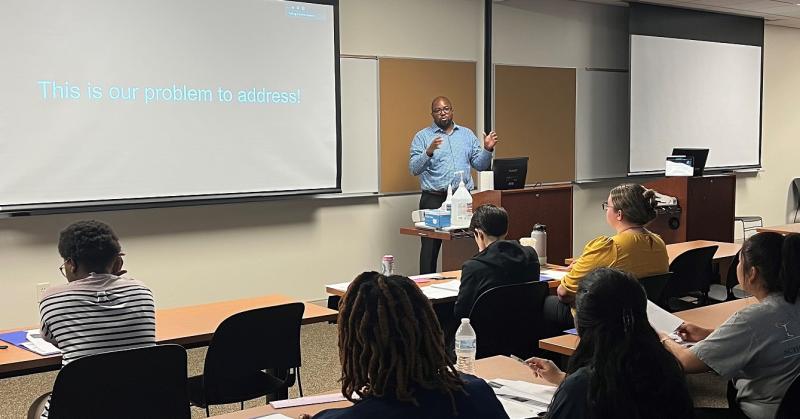
By Liz Switzer
Health disparities and community engagement are two hot topics in medicine today, and the Duke Center for AIDS Research (CFAR) is meeting both challenges head on with the Evidence2Practice (E2P) program. E2P is designed to increase interest in HIV science careers for students at Historically Black Colleges and Universities (HBCU) and Institutions of Higher Education that Serve Minority Populations (MSI).
E2P is an intensive on-campus workshop-based initiative that provides an experience-based introduction to implementation science, developed out of a four-year long collaborative partnership between Nwora Lance Okeke, MD, MPH, assistant professor (Infectious Diseases and Population Health Sciences) and program director, and external partners from South University and HIV/AIDS Network Coordination (HANC), an organization that provides leadership and logistical support for cross-network coordination efforts nationally and internationally.
The majority of HIV infections across the country impact people of color, Okeke points out, so it makes sense to have a workforce that looks more like the people that need to be served. But the number of HBCU students entering higher education science programs is very low, for HIV science in particular, he adds: less than five percent of all PIs with HIV grants come from HBCUs.
“A lot of these institutions are underfunded,” Okeke says. “In spite of this reality, they often have very deep relationships with the communities they serve, they are service-oriented and embedded in low income and rural communities in the South, primarily. As a result, the students and faculty of these institutions bring a unique and critical perspective to population-level HIV prevention strategies, and healthcare overall.”
Thank You, Dr. Anthony Fauci
Okeke has been drawn toward eradicating HIV for a long time, but more recently the prospect of tackling the public health crisis that has plagued the world for the last 40 years seems like a reality worth actively pursuing—thanks in part to Dr. Anthony Fauci, director of the National Institute of Allergy and Infectious Diseases. Okeke saw Fauci speak at the CFAR Directors’ Meeting at University of North Carolina-Chapel Hill in October 2019, and came away feeling deeply inspired by the presidential advisor’s remarks addressing the availability of tools that could be used to end the HIV epidemic once and for all.
“He made a very compelling case for ending the HIV epidemic once and for all. Even though HIV prevention was always an area of interest for me, his presentation brought the gravity and potential of this moment, this opportunity, together for me,” Okeke says. “In the next generation, we have the opportunity to solve the HIV epidemic, one of the most formidable and tragic public health crises of our time. That is enough to motivate me every day.”
The three-day workshop is offered during the Spring Semester 2021-22 and Fall Semester 2022-23 at six HBCUs in South Carolina, a priority jurisdiction of the Department of Health and Human Services Ending the HIV Epidemic initiative, which aims to reduce new HIV infections in the U.S. by 90% by 2030 by scaling up key HIV prevention and treatment strategies.
Funded with a supplement from the CFAR Pipeline Initiative (CPI), two of the workshops have been conducted thus far, at Voorhees College in Denmark, SC and most recently at South University in Columbia, S.C. in late April 2022. The CPI was developed at the request of the National Institutes for Health (NIH) as a component of the broader NIH UNITE initiative to address structural racism in biomedical research.
Key Concepts
Workshops are based on key concepts of human-centered design and task participating eight to 10 student teams to create a short campus-specific action plan for enhancing knowledge of HIV pre-exposure prophylaxis (PrEP) on their campuses. A series of introductory lectures on HIV epidemiology, implementation science, human-centered design and current HIV prevention modalities, by Duke CFAR members precede the design activities.
“After participating in this program, I have developed a better understanding of implementation science and how it can impact the field of pharmacy and help to reduce the infection of many communicable diseases,” said South University student and participant, Mia Turner.
Okeke partners with Amy Corneli, PhD, MPH, associate professor (population health sciences and medicine), who serves as the program evaluation director. Corneli, together with the Department of Population Health Sciences QualCore program, is conducting a mixed-method assessment of the program. “It’s important to document how E2P may influence students’ degree and career trajectories so we can improve the program as needed and continue to inspire students in the future to choose careers in HIV science” says Corneli.
“To end the epidemic, we need researchers of color, many clinicians of color, and we need a diverse community that reflects populations most afflicted by the HIV epidemic in the US,” says Okeke.
Photo: Duke Professor Lance Okeke works with HBCU students last week during a workshop in South Carolina.